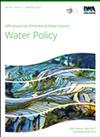从议会问题中确定国家河流治理中不断变化的优先事项
IF 1.8
4区 环境科学与生态学
Q4 WATER RESOURCES
引用次数: 0
摘要
河流及其周围的土地提供的资源和服务需要立法和制度干预,因此,法律制定者的观点及其社会价值观和政治权宜之计在决策中起着重要作用。本研究批判性地评估了具有复杂发展优先级的大型民主选举政府中不断发展的陆地-河流治理,以及法律制定者对河流管理新问题的认识如何影响公共池环境资源治理。我们选择了一个新兴经济体——印度——并使用混合方法分析了1999年至2020年间的议会问题(PQs)。在经济发展、污染管理、社会文化价值和国家间中心问题上相互冲突的优先事项形成了陆地-河流治理的不断演变的优先事项。减少对大型水坝的关注,同时增加对流域间调水、河流养护和减少污染的关注,表明一种转变,不再像以前那样狭隘地认为河流用于灌溉和水力发电。我们的分析展示了法律制定者的优先事项和政治权宜之计如何在河流治理中发挥关键作用,从而为可持续发展的公共池环境资源治理提供了重要见解,同时也确定了重要的知识差距并提出了跨学科研究的范围。本文章由计算机程序翻译,如有差异,请以英文原文为准。
Identifying evolving priorities in national river governance from Parliamentary Questions
Rivers and their surrounding land provide resources and services that result in trade-offs requiring legislative and institutional interventions, for which the perspectives of law-policymakers and their societal values and political expediencies play a major role in decision-making. This study critically evaluates the evolving land–river governance in large democratically elected governments with complex developmental priorities and how law-policymakers’ recognition of emerging issues of river management influences common pool environmental resources governance. We selected an emerging economy – India – and analysed Parliamentary Questions (PQs) between 1999 and 2020 using a mixed method approach. Conflicting priorities over economic development, pollution management, socio-cultural values and inter-state–centre issues shape the evolving priorities of land–river governance. A declining focus on large-scale dams coupled with increasing attention on inter-basin water transfers, river conservation and pollution abatement, demonstrates an evolution away from the earlier narrow view of rivers for irrigation and hydropower. Our analysis demonstrates how the priorities of law-policymakers and political expedience play a critical role in river governance and thereby provide important insights into common pool environmental resources governance for sustainable development while also identifying important knowledge gaps and suggesting scopes for interdisciplinary studies.
求助全文
通过发布文献求助,成功后即可免费获取论文全文。
去求助
来源期刊

Water Policy
环境科学-水资源
CiteScore
3.10
自引率
12.50%
发文量
81
审稿时长
6-12 weeks
期刊介绍:
Water Policy will publish reviews, research papers and progress reports in, among others, the following areas: financial, diplomatic, organizational, legal, administrative and research; organized by country, region or river basin. Water Policy also publishes reviews of books and grey literature.
 求助内容:
求助内容: 应助结果提醒方式:
应助结果提醒方式:


